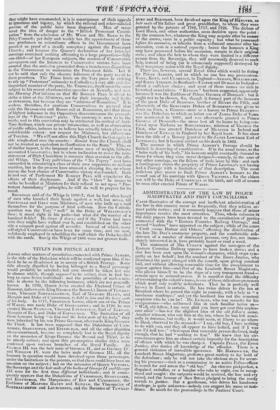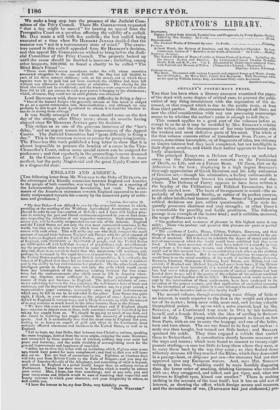ADMINISTRATION OF THE LAW BY POLICE MAGISTRATES AND PRIVY COUNCILLORS.
CASES illustrative of the corrupt and inefficient administration the law in this country occur so frequently, that they seldom at-
tract public notice ; and it commonly happens that those of minor importance receive the most attention. Thus, whole columns in the daily papers have been devoted to the examination of parties
connected with the " Eastern Counties Railway Outrage, and several "leaders" have appeared on the subject; while of the cause
" Croft versus Dufliur and Others," affecting the distrihution of the late Mr. Day's enormous property, and the comfortable sub- sistence of a number of distressed persons, very few, not imme-, diately interested in it, have probably heard or read a word.
The statement of Mrs. CULLUM against the managers of the Eastern Counties Railway appears to have broken down ; and a
slur has been cast upon the woman's character, which stops Sym- pathy on her behalf; but the conduct of the Essex Justice, who dismissed the party charged with the assault, upon giving nominal bail, and without allowing reasonable thne for the complainant to
appear against him—and that of the Lambeth Street Magistrate, who allows himself to be the dupe of a very transparent fraud—
remain open to animadversion. It is manifest that the difficulty of ascertaining the culprit's name, is one of those ridiculous pretences which avail only wealthy defendants. That be is perfectly well
known in Essex is certain. He has twice driven to the inn at
Stratford where he passed the night in custody, with a lady iii " a handsome stanhope ;" and yet the landlord has not, the remotest suspicion who he can be I Mr. Lusimiy, who was security for his reappearance—who addressed him in such familiar terms as- " Well, old fellow, I am very glad you have got over this unplea- sant affair"—has not the slightest idea of the old pllow's name. Another witness, who saw him at the inn, where lie was left notni- nally in durance, but really, it would seem, at liberty to go where he liked, observed to the accused—" I say, old boy, I have nothing to do with you, and they all appear to have bolted, and if' I was you I'd bolt too :" whereupon that venerable person declared, truly enough, that he had " nothing to fear." He knew that his cir-
cumstances gave him an almost certain impunity for the description of Aimee with which he was charged. Captain PELLY, the Essex Justice, also denies all knowledge of the offender. There is a
general visitation of incredible ignorance. Mr. Hsunwicas, the Lambeth Street Magistrate, professes great anxiety to lay hold of the defendant ; only he . not take the obvious steps for secur- ing his presence—such as a commission to an active Police-officer to search for and arrest the "old boy." An obscure pickpocket, a disguised swindler, or a burglar who robs by night, can be recog- nized and caught: the outposts would be scoured, the hue and cry raised, and the honour of Bow Street pledged to bring the needy
wretch to. justice. :But a gentleman, who drives his handsome stanhone, as quite unknown—nobody can suggest his name or reel- &nee. So much for the proceedings in the justices' Court.
We make a long step into the presence of the Judicial Com- mittee of the Privy Council. There Mr. GutemEsToxHrequested "that a day might be named" for hearing an appeal from the Prerogative Court on a question affecting the validity of a codicil. Mr. DAY made a will with five codicils ; the last codicil being executed at a time when Sir Hemmer JENNER decided that the testator was " not in a testamentary state of mind." The execu- tors named in this codicil- appealed from Sir HERBERT'S decision, and this appeal Mr. GIRDLESTONE wished to bring before the Judi-
cial Committee of the Privy Council. The property locked up ' until the cause should be decided is immense ; including, among other bequests, 100,000/. to found a charity to be called "The Blind Man's Friend"— "There were thirty-seven annuitants under the will, whose annuities amounted altogether to the sum of 84,000/. Mr. Day hail left 10,000/. to
each of his three natural children; and, as the money out of which these legacies were to be paid bad not been received, the children hail been left without any allowance for maintenance or education. The charity for the blind also could not be established ; and the trustees were empmverod to allow from 10/. to 15/. per annum to each peer person belonging to thc almshouses; which, of course, they could not do until probate was obtained."
Lord BROUGHAM said, there was great difficulty in fixing a day—. "One of the learned Judges who generally attends at this board is obliged to go on a special commission. into Monmouthshire ; and although we may probably he able to get Lord Lyndhurst to attend, it is doubtful whether he can do so during these sittings." It was finally arranged that the cause should come on the first day of the sittings after Hilary term ; about six months having elapsed since Sir HERBERT JENNER gave his decision.
This strikes us as one of the grievous instances of the "law's delay," and an urgent reason for the improvement of the Appeal Courts. The Judicial Committee had "great difficulty in fixing a
day." This is the common reason or excuse for postponing justice. The Times has this week published a long letter to show that it is
almost impossible to procure the bearing of a cause in the Vice-
Chancellor's Court, unless some special reason can be assigned for preference ; and that regularity in the proceedings is never dreamed
of. In the Common Law Courts at Westminster there is more method, but the petty Magisterial and the great Equity Courts are in a disgraceful state.



























 Previous page
Previous page